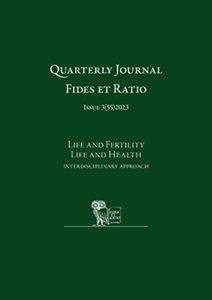Abstract
Introduction and objective: The first experience of entering a profession has a huge impact on an employee’s later life. They affect motivations for development, relationships with co-workers, and in the medical sector will directly translate into patient safety and well-being. When midwives take up their first job, they face challenges and obstacles related not only to their inexperience, but also to communication in teams, the implementation of which requires time and commitment on both sides–the implementing and experienced employee. Material and methods: The aim of the research presented here was to identify difficulties related to communication in midwifery teams, especially at the level of experienced–inexperienced midwife and to find out the opinions on mentoring as a way to support in the first months of work. The study was conducted by means of group interviews. Three interviews were conducted with a total of 11 midwives with 1-2 years of professional experience working in hospital wards in three Polish cities. Results: In the participants’ statements, three issues were singled out as the most important issues raised related to the difficulties of the first months at work: the organization of the induction system, the sense of mutual trust in the team of co-workers and the inequality of wages. Conclusions: A sense of security resulting from mutual trust and acceptance is crucial for young midwives entering the profession. A factor conducive to a smooth socialization process to work is a properly functioning mentoring system. Communication difficulties that cause division in teams, may be related to the inequality of salaries, resulting from the disparity in the level of education of midwifery staff in hospital wards.
References
Babiarczyk, B., Fraś, M., Ulman-Włodarz, I., Jarosova, D. (2014). The level of job satisfaction and its relation to midwives’ subjective quality of life, Medycyna Pracy [Preprint]. https://doi.org/10.13075/mp.5893.2014.011
Bańkowska, A. (2016). Syndrom wypalenia zawodowego – symptomy i czynniki ryzyka, Pielęgniarstwo Polskie, 60(2), 256–260. https://doi.org/10.20883/pielpol.2016.20
Barnaś, E. (2016). Pattern ethical communicationin the therapeutic team, Health Promotion & Physical Activity, 1(1), 9–22. https://doi.org/10.5604/01.3001.0010.7697
Bradford, H., Hines, H.F., Labko, Y., Peasley, A., Valentin-Welch, M., Breedlove, G. (2022). Midwives Mentoring Midwives: A Review of the Evidence and Best Practice Recommendations, Journal of Midwifery & Women’s Health, 67(1), 21–30. https://doi.org/10.1111/jmwh.13285.
Fenwick, J., Hammond, A., Raymond, J., Smith, R., Gray, J., Foureur, M., Homer, C., Symon, A. (2012). Surviving, not thriving: a qualitative study of newly qualified midwives’ experience of their transition to practice: Surviving, not thriving, Journal of Clinical Nursing, 21(13–14), 2054–2063. https://doi.org/10.1111/j.1365-2702.2012.04090.x
Górka, E., Kunecka, D., Szylińska, A., Ptak, M. (2019). Coaching and mentoring in nursing practice, Pomeranian Journal of Life Sciences, 65(1), 98–104. https://doi.org/10.21164/pomjlifesci.547
Hastie, C.R., Barclay, L. (2021). Early career midwives’ perception of their teamwork skills following a specifically designed, whole-of-degree educational strategy utilising groupwork assessments, Midwifery, 99, 102997. https://doi.org/10.1016/j.midw.2021.102997
Hopkinson, M.D., Kearney, L., Gray, M., George, K. (2022). New graduate midwives’ transition to practice: A scoping review, Midwifery, 111, 103337. https://doi.org/10.1016/j.midw.2022.103337
Jagodzińska, A., Rezmerska, L. (2017). Czynniki wpływające na podnoszenie poziomu kwalifikacji zawodowych pielęgniarek w ramach kształcenia podyplomowego, Innowacje w Pielęgniarstwie, 2(4), 44–60. https://doi.org/10.21784/IwP.2017.022
Katra, G. (2020). Socjalizacja i wychowanie na przestrzeni całego życia. (W:) K. Bargiel-Matusiewicz, M. Ledzińska (red.), Psychologiczne mechanizmy regulacji z perspektywy zdrowia i choroby, 17-45, Warszawa: Wydawnictwo Liberi Libri.
Kędzierska, H. (2018). Socjalizacja profesjonalna nauczycieli na starcie kariery zawodowej – druga strona medalu, Zarządzanie publiczne (Uniwersytetu Jagiellońskiego), 41(1), pp. 75–89. https://doi.org/10.4467/20843968ZP.18.006.8235
Kołodziej, A. (2014). Czynniki określające status społeczny pielęgniarek, Hygiea, 49(1), 69-74.
McKibben, L. (2017). Conflict management: importance and implications, British Journal of Nursing, 26(2), 100–103. https://doi.org/10.12968/bjon.2017.26.2.100
Mielecka, D. (2021). Determinanty satysfakcji zawodowej pielęgniarek a racjonowanie opieki pielęgniarskiej. Rozprawa doktorska, Wrocław: Uniwersytet Medyczny im. Piastów Śląskich.
Pradela, K., Radosz, Z., Sobiegała, A. (2020). Nursing education in Poland, Pielegniarstwo XXI wieku / Nursing in the 21st Century, 19(1), 47–56. https://doi.org/10.2478/pielxxiw-2020-0008
PRIMA-EF, Psychosocial Risk Management Excellence Framework. (From:) http://www.prima-ef.org/prima-ef.html (access: 02.02.2023)
Regan, S., Wong, C., Laschinger, H.K., Cummings, G., Leiter, M., MacPhee, M., Rhéaume, A., Ritchie, J.A., Wolff, A.C., Jeffs, L., Young-Ritchie, C., Grinspun, D., Gurnham, M.E., Foster, B., Huckstep, S., Ruffolo, M., Shamian, J., Burkoski, V., Wood, K., Read, E. (2017). Starting Out: qualitative perspectives of new graduate nurses and nurse leaders on transition to practice, Journal of Nursing Management, 25(4), 246–255. https://doi.org/10.1111/jonm.12456
Ustawa z dnia 26 maja 2022 roku, o zmianie ustawy o sposobie ustalania najniższego wynagrodzenia zasadniczego niektórych pracowników zatrudnionych w podmiotach leczniczych oraz niektórych innych ustaw.
Wieder-Huszla, S., Żak, B., Jurczak, A., Augustyniuk, K., Schneider-Matyka, D. (2016). Occupational burnout among nursing personel, Family Medicine & Primary Care Review, 1, 63–68. https://doi.org/10.5114/fmpcr/59057.
Witczak, I., Rypicz, Ł. (2020). Bezpieczeństwo pacjentów i personelu medycznego: uwarunkowania ergonomiczne, Wrocław: Uniwersytet Medyczny im. Piastów Śląskich.

